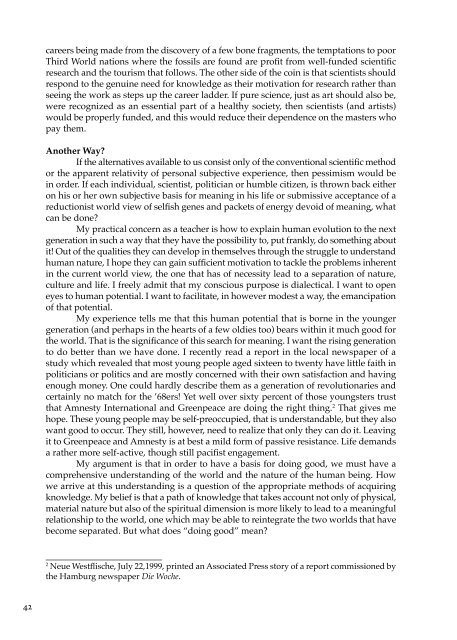The Spirit in Human Evolution - Waldorf Research Institute
The Spirit in Human Evolution - Waldorf Research Institute
The Spirit in Human Evolution - Waldorf Research Institute
You also want an ePaper? Increase the reach of your titles
YUMPU automatically turns print PDFs into web optimized ePapers that Google loves.
careers be<strong>in</strong>g made from the discovery of a few bone fragments, the temptations to poor<br />
Third World nations where the fossils are found are profit from well-funded scientific<br />
research and the tourism that follows. <strong>The</strong> other side of the co<strong>in</strong> is that scientists should<br />
respond to the genu<strong>in</strong>e need for knowledge as their motivation for research rather than<br />
see<strong>in</strong>g the work as steps up the career ladder. If pure science, just as art should also be,<br />
were recognized as an essential part of a healthy society, then scientists (and artists)<br />
would be properly funded, and this would reduce their dependence on the masters who<br />
pay them.<br />
Another Way?<br />
If the alternatives available to us consist only of the conventional scientific method<br />
or the apparent relativity of personal subjective experience, then pessimism would be<br />
<strong>in</strong> order. If each <strong>in</strong>dividual, scientist, politician or humble citizen, is thrown back either<br />
on his or her own subjective basis for mean<strong>in</strong>g <strong>in</strong> his life or submissive acceptance of a<br />
reductionist world view of selfish genes and packets of energy devoid of mean<strong>in</strong>g, what<br />
can be done?<br />
My practical concern as a teacher is how to expla<strong>in</strong> human evolution to the next<br />
generation <strong>in</strong> such a way that they have the possibility to, put frankly, do someth<strong>in</strong>g about<br />
it! Out of the qualities they can develop <strong>in</strong> themselves through the struggle to understand<br />
human nature, I hope they can ga<strong>in</strong> sufficient motivation to tackle the problems <strong>in</strong>herent<br />
<strong>in</strong> the current world view, the one that has of necessity lead to a separation of nature,<br />
culture and life. I freely admit that my conscious purpose is dialectical. I want to open<br />
eyes to human potential. I want to facilitate, <strong>in</strong> however modest a way, the emancipation<br />
of that potential.<br />
My experience tells me that this human potential that is borne <strong>in</strong> the younger<br />
generation (and perhaps <strong>in</strong> the hearts of a few oldies too) bears with<strong>in</strong> it much good for<br />
the world. That is the significance of this search for mean<strong>in</strong>g. I want the ris<strong>in</strong>g generation<br />
to do better than we have done. I recently read a report <strong>in</strong> the local newspaper of a<br />
study which revealed that most young people aged sixteen to twenty have little faith <strong>in</strong><br />
politicians or politics and are mostly concerned with their own satisfaction and hav<strong>in</strong>g<br />
enough money. One could hardly describe them as a generation of revolutionaries and<br />
certa<strong>in</strong>ly no match for the ’68ers! Yet well over sixty percent of those youngsters trust<br />
that Amnesty International and Greenpeace are do<strong>in</strong>g the right th<strong>in</strong>g. 2 That gives me<br />
hope. <strong>The</strong>se young people may be self-preoccupied, that is understandable, but they also<br />
want good to occur. <strong>The</strong>y still, however, need to realize that only they can do it. Leav<strong>in</strong>g<br />
it to Greenpeace and Amnesty is at best a mild form of passive resistance. Life demands<br />
a rather more self-active, though still pacifist engagement.<br />
My argument is that <strong>in</strong> order to have a basis for do<strong>in</strong>g good, we must have a<br />
comprehensive understand<strong>in</strong>g of the world and the nature of the human be<strong>in</strong>g. How<br />
we arrive at this understand<strong>in</strong>g is a question of the appropriate methods of acquir<strong>in</strong>g<br />
knowledge. My belief is that a path of knowledge that takes account not only of physical,<br />
material nature but also of the spiritual dimension is more likely to lead to a mean<strong>in</strong>gful<br />
relationship to the world, one which may be able to re<strong>in</strong>tegrate the two worlds that have<br />
become separated. But what does “do<strong>in</strong>g good” mean?<br />
_________________________<br />
2<br />
Neue Westflische, July 22,1999, pr<strong>in</strong>ted an Associated Press story of a report commissioned by<br />
the Hamburg newspaper Die Woche.<br />
42
















